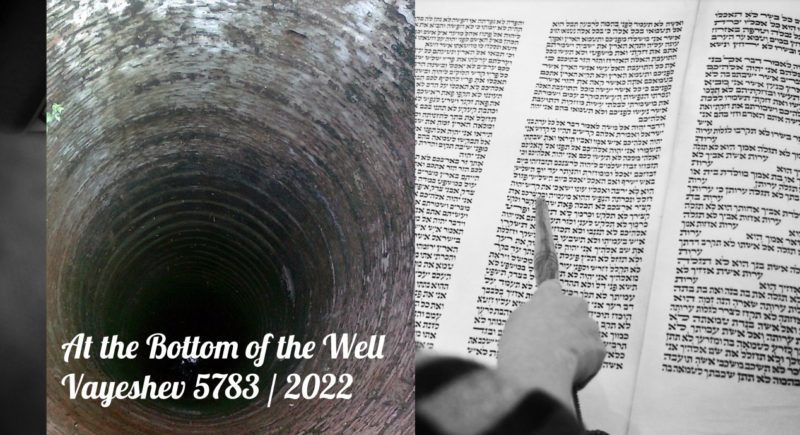At the Bottom of the Well (Vayeshev 5783 / 2022)
Vayeshev is an amazing Torah portion. Joseph and his brothers, dreams, jealousy, the descent into Egypt and rise into Pharaoh’s service, plus the story of Judah and Tamar! And yet when I first turned to the wellspring of Torah to see what calls to me this year, my dipper came up empty. I felt like I had nothing new to say. I felt tapped-out: a well that’s run dry.
I said to a few people: wow, I’m kinda tapped-out this week. Help me out here: if you were going to shul this week, what would you want your rabbi to talk about? And a surprising number of people said: talk about exactly that. A lot of us are feeling empty, tapped-out, struggling. We’re heading into our third Covid winter, and to a lot of people it feels like we’ve given up.
There’s cognitive dissonance between, “We just have to live with it,” and yet anyone who’s had Covid has “increased risk of stroke, blood clots, heart failure and heart attacks.” (Source: Johns Hopkins.) Meanwhile there’s a tridemic. And medicine shortages. And the drumbeat of the next presidential election. And let’s not forget the climate crisis or global geopolitics.
That’s a lot. It’s really, truly a lot. And there’s also all the ordinary stuff that can make life difficult sometimes: injustice, illness, mortality. If your well feels empty, you are not alone. So what do we do with that? I read the parsha again, and this time I noticed when Joseph’s brothers “took him and cast him into the pit. The pit was empty; there was no water in it.” (Gen. 37:24)
What does that evoke for you? I get a flurry of images: I’m at the bottom of a stone tower set deep into the earth. The light of the sky is far away. I can’t climb out. Rashi says there are scorpions. Torah doesn’t tell us anything about Joseph’s internal state at the bottom of the pit. But we do know something about the experience he has later, when he’s thrown in prison.
When Joseph is imprisoned, Torah tells us, God is “with Joseph.” (Gen. 39:20-21) We don’t know what changed in him or how it changed, but it seems that now he can feel God’s presence. And while in prison he interprets dreams for his fellow prisoners. He helps the people around him. That’s one of our tools for tough times: helping others however we can.
When I’ve felt depressed, it’s hard to believe there’s a way out. But when someone I love is at the bottom of that well, I assure them that life won’t always be this, and I mean it. I can reach emunah, trust or faith, for others when I can’t feel it for me. And I think that’s part of the human condition. As Talmud teaches, “A prisoner cannot free themself from prison.”
My friend and hevruta Rabbi David points out that Torah uses the term בֵּ֣ית הַסֹּ֔הַר / beit ha-sohar, while Gemara says בֵּית הָאֲסוּרִים / beit ha-asurim. Sohar means round, like a round dungeon. Ramban says it implies a place of very little light. In other words, Joseph’s symbolically back in the empty well where he began, but now he feels God with him.
Talmud’s term asur means forbidden, prohibited, no way, no you can’t. Beit ha-asurim is the House of Can’t. It’s that helpless, maybe despairing, sense of being stuck. The Gemara is clear that we can’t free ourselves from the House of Can’t. Someone – or some One – has to free us. And maybe it’s both at once: God deploys us to help each other break free.
As for Joseph, so for us – even if we can’t feel God’s presence. (And as always I mean whatever “the G-word” evokes for us: justice or love, integrity or hope.) Our job is to help each other trust that, in Torah’s language, God is with us even here. That holiness and justice and hope are with us, even if we can’t feel them. That our cup won’t always feel empty.
If you’re not feeling stuck or disheartened or at the bottom of the well, you have an opportunity to reach out to someone who is. And if you are at the bottom of that well, trust me when I promise you that life won’t always be this. We can hold on to that for you until you can feel it again.
We can’t free ourselves from the House of Can’t. It’s right there in the name. But we can be liberators for each other, and I’d argue that we have to be. Even (or especially) now, approaching the year’s darkest day, here at the bottom of December’s dry well.
This is the d’varling that Rabbi Rachel offered at Kabbalat Shabbat services at Congregation Beth Israel of the Berkshires (cross-posted to Velveteen Rabbi.)






